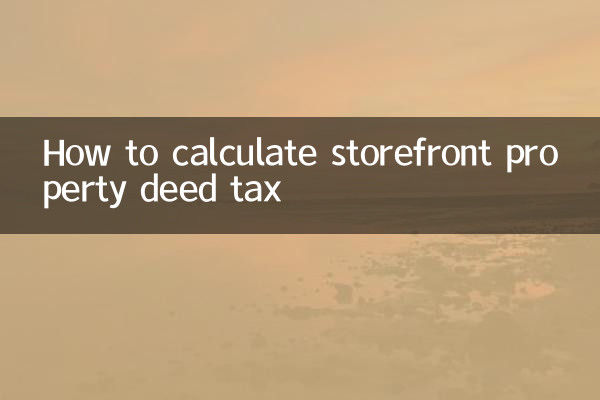How to calculate storefront property deed tax
In recent years, with the prosperity of commercial real estate, more and more people have begun to pay attention to the sale and tax of storefront properties. Among them, deed tax is an inevitable expense in the process of purchasing a house. So, how is the deed tax for storefront properties calculated? This article will give you a detailed analysis based on the latest policies and actual cases.
1. What is storefront property deed tax?

Deed tax refers to a tax paid by the recipient when real estate is sold, donated or exchanged. As a commercial property, the deed tax calculation method for storefront houses is different from that for residential houses. The following are relevant policy points that have been hotly debated across the Internet in the past 10 days:
| Project | Residential deed tax rate | Storefront deed tax rate |
|---|---|---|
| first suite | 1%-1.5% | 3%-5% |
| Second suite and above | 1.5%-3% | 3%-5% |
| gift or inheritance | 3%-5% | 3%-5% |
2. Specific calculation method of storefront property deed tax
The calculation of storefront deed tax is usually based on the appraised value or transaction price of the house (whichever is higher). The following are the specific calculation steps:
| steps | Description | Example (assuming the appraisal price is 1 million yuan) |
|---|---|---|
| 1. Determine the tax rate | Commercial real estate deed tax is generally 3%-5%, which is subject to local policies. | Calculated as 4% |
| 2. Calculate the deed tax amount | Deed tax = assessed value × tax rate | 1 million × 4% = 40,000 yuan |
3. Factors affecting storefront property deed tax
1.Local policy differences: Different cities may have slight adjustments to the deed tax rate for commercial properties. For example, first-tier cities may have higher rates. 2.House property: The tax rates for pure storefront houses and commercial-residential houses may be different. 3.Transaction method: The tax calculation rules are different for sales, gifts or inheritances.
4. How to reduce the deed tax cost of storefront property?
1.Reasonable declared price: Within the legal scope, you can negotiate with the seller to appropriately lower the contract transaction price. 2.Pay attention to tax benefits: Some regions have deed tax reduction and exemption policies for small and micro enterprises or specific industries. 3.Choose the right trading method: For example, indirect transaction of real estate through equity transfer may save taxes.
5. Recent hot cases
According to a financial media report, a storefront property transaction dispute recently occurred in a second-tier city. The buyer did not understand the deed tax policy in advance, resulting in additional expenses of tens of thousands of yuan. Experts remind:Always consult a professional agency before commercial real estate transactions.
Conclusion
The calculation of storefront property deed tax involves multiple variables. It is recommended that home buyers understand local policies in detail before making a transaction and conduct accurate calculations through professional appraisal agencies or tax consultants. Reasonable planning of tax costs can make business investment more efficient.
The content of this article is based on public policies and industry consensus. Please refer to the requirements of local tax authorities for specific implementation.

check the details

check the details